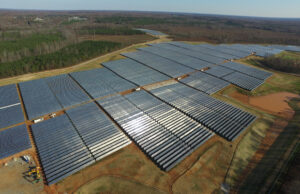Solar energy is the cheapest source of electricity now available, solar advocates tell us, and that’s a big reason we should build more of it in Virginia. At the same time, says the solar lobby, the industry needs local-government tax breaks, in particular a state-mandated 80% exemption from local machine-and-tool taxes.
“If that tax incentive was not in place, you could not have the had the kind of development that was necessary,” David Murray, executive director of the Maryland-DC-Delaware-Virginia Energy Industry Association, tells the Register & Bee website at GoDanRiver.com.
So, which is it? Is solar the cheapest electricity source available, or the cheapest just when poor rural local governments are compelled by the state to grant massive tax breaks?
Pittsylvania County, the county adjacent to the City of Danville, has one solar farm in operation and has granted permitting for eight others. The county expects to benefit from two revenue streams: property taxes and machine & tool taxes. Under legislation in effect since 2016, small solar projects (less than 20 megawatts capacity) are entirely exempt from the M&T tax, while larger projects are 80% exempt. Moreover, under the State Corporation Commission depreciation schedule, utility-scale solar is taxed at 90% of value in the first five years but only 10% of value by year 25.
“We only getting 20% of that 10%,” said Scott Simpson, county administrator for neighboring Halifax County where six utility-scale solar projects have received local approval.
Solar projects also benefit from a Federal Solar Tax Credit which allow companies and individuals to deduct 26% of the installation cost from federal taxes. That number is scheduled to decline to 10% over the next few years.
Although it has encountered heavy local resistance in some localities, the solar industry hasn’t had much trouble finding sites to build vast new solar farms. Here’s the interesting issue to me: Is the M&T exemption really necessary to advance the solar industry in Virginia, or does the tax break represent a forced subsidy by rural areas (where the solar farms are located) to urban areas (where the green consumers are located)?
To be sure, the machine & tool tax is a baneful, anti-business tax, and I share the view of many others that local governments should phase it out entirely — assuming they can find an alternate revenue source. But the tax isn’t being phased out, it’s being applied in a discriminatory manner. It’s one of the few tools that rural localities have to pay for schools and other local government services, and it’s been taken away by wealth urban elites who want to signal their virtue by bequeathing a tax break (at no expense to themselves) upon a favored green industry.
To be sure, solar is the cheapest form of electricity out there on a raw cost-per-kilowatt-hour basis. The calculation is more complicated if you factor in the intermittent nature of solar production and the necessity of providing backup capacity when the sun isn’t shining. But the promoters of solar have made it crystal clear that cost is not the object. They’re willing to compel electricity consumers to pay whatever it takes to move Virginia toward a 100% clean energy grid. So, a few tenths of a penny per kilowatt more or less to pay the M&T tax is not a serious obstacle to the deployment of solar power in Virginia.
A higher M&T tax could impact the site selection process. A lower M&T tax in Mecklenburg County compared to Pittsylvania County, say, could be the decisive factor that induces a solar developer to locate in the the former and not the latter. But that’s the business of the counties themselves. Who is better positioned to make those kinds of trade-offs than the local boards of supervisors? Certainly not the General Assembly.
I don’t particularly fault the solar lobby for pushing for the statewide tax break. That’s what industry groups do — they lobby for special privileges. The solar lobby is no different from, say, Dominion Energy, which has lobbied successfully for plenty of its own special privileges. My problem is with the virtue signalers who are so free and loose with other peoples’ money. Let no expense be spared to promote clean energy — as long as someone else is paying!
Maybe the tax break was justified at one time to get Virginia’s solar industry off the ground. Well, the industry is off the ground. Indeed, it’s soaring like an eagle. At this point, perpetuating the tax break is Robin Hood in reverse: taking from the poor and giving to the rich.


Leave a Reply
You must be logged in to post a comment.